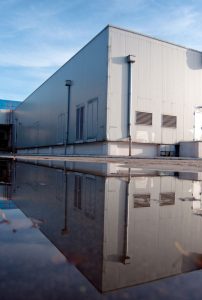Picture the scene: it’s Monday morning. The weather has been awful over the weekend. Your client has arrived on site to find flash flooding has left damage to their building, and the car park is underwater. The company needs to close for the next few days while repairs and clean-ups take place, leaving staff stuck at home and customers unable to do business with the firm.
It’s a scene becoming all too common. In fact, July saw the highest ever number of flood claims per month from commercial properties – doubling the previous record.
Flooding and its risk to businesses
Nearly one in three business premises in the UK are at risk of flooding ; the average cost of flood damage to companies is around £82,000 and figures show small businesses can lose up to 50 working days when they experience flooding leading to loss of custom and damage to their reputation.
There is significant evidence that heavy rainfall events are becoming more frequent in the UK due to climate change , so much needs to be done to ensure the existing infrastructure in our towns and cities can cope when flooding occurs. Proficient drainage is essential to protect those businesses that need it most.
 The role of drains in minimising flood damage
The role of drains in minimising flood damage
Localised flooding occurs when sewer and drainage systems become overwhelmed by sudden downpours. This happens when drains aren’t properly maintained and are blocked with debris, meaning water can’t naturally flow downwards towards an outlet. But because urban floodwaters typically become mixed with sewage, a significant flooding event also poses additional health risks and even higher repair costs to properties.
While it’s almost impossible to completely eliminate the risk of flooding, there are tools and services available to facilities managers which enable them to make sure the drains supporting their companies, clients and wider communities are fit for purpose , ensuring businesses can minimise the costs and disruption that flooding brings.
Proactive preparation
Drainage gullies are great at removing surface water from a property or car park, but if they aren’t maintained, silt can build up and solidify, preventing surface water from effectively draining away. To help, regular de-silting will ensure a property’s drains are well maintained and minimise problems in the event of heavy rainfall.
Another tool in your proactive preparation should be regularly cleaning your drains. This prevents debris from leaves, mud, grease, fat and oils that often end up in drains collecting and clogging the drain, reducing its capacity to handle excess rainfall. Specialist drain maintenance services such as high-pressure water jetting can be used to clear the drains, and flush out the system to prevent future blockages which can lead to flooding.
If the properties you maintain have a car park, no matter how big or small, drain interceptors are one of the essential tools you should consider. Often seen as the final point of drainage defence, they are designed to stop silt, oil and grease which sit on the surface of industrial sites or car parks entering the drainage system — separating pollutants from the stormwater and preventing the build-up of debris. Likewise, if your property features commercial kitchens, a grease trap, if well maintained, can prevent fat, oil and grease from entering the drainage system and adding to the risk of a blockage.
Meanwhile, drain mapping should become a vital part of your flood risk management. Knowing the layout of the drainage network sitting below a business educates you on where surface water should drain away and gives you the knowledge to quickly identify where a problem may lie, and how you can access it should flash flooding occur.
As we move into winter, the added seasonal demand and adverse weather will increase pressure on drains across the country, so the best time to begin managing the risk of flooding is now. Our nationwide team of local engineers are available 24/7, 365 days a year, operating from over 50 depots which are within one hour’s travel time of 85 per cent of commercial properties in the UK. By taking steps today to plan for the future, businesses will be better prepared to handle whatever it is the weather throws at us in the coming months.
To discuss your flood risk management and how drain maintenance can help protect your property or to arrange a free site-visit, contact Metro Rod on 01625 507 945 or visit www.metrorod.co.uk
-ends-
To have your industry news published in the pages of FMJ’s news section, Month in FM, and here online on fmj.co.uk, please send your news and image to Danny Grange danny.grange@kpmmedia.co.uk
The view or information contained within these unedited press releases, are that of the company producing it and not necessary the views of kpm.




